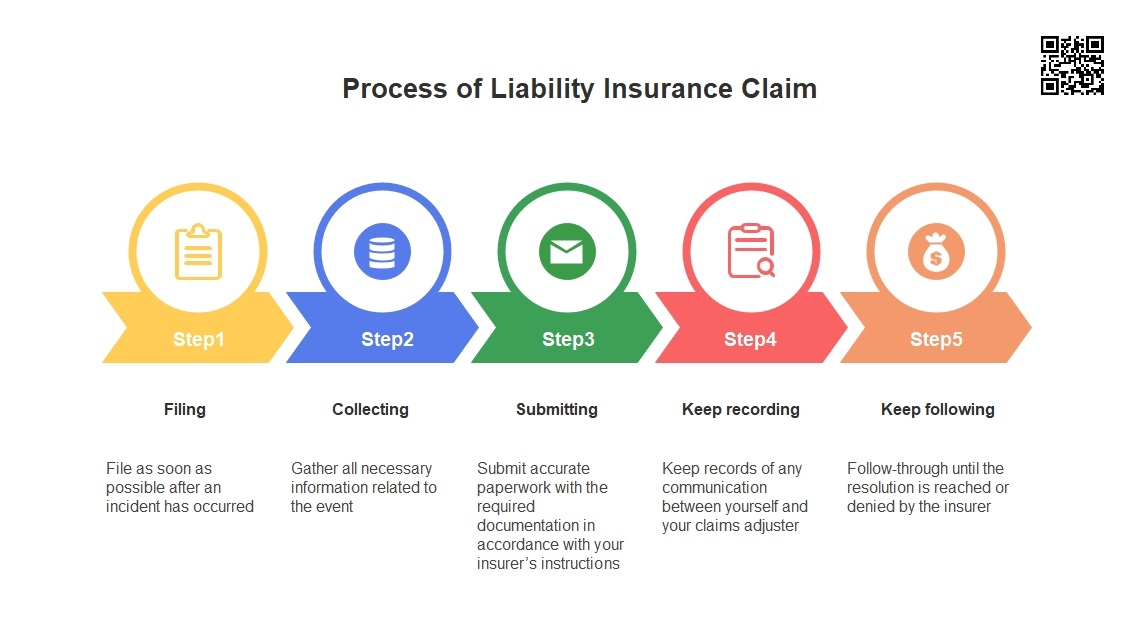Introduction
As a contractor, liability insurance can be an essential part of your business. Not only does it protect you against potential legal and financial risks, but it also gives your clients the confidence that their project is in safe hands. If you’re looking for comprehensive protection from lawsuits or damages connected to accidents on the job, then this ultimate guide to liability insurance for contractors is just what you need!
We’ll take you through all the different types of coverage available so that you can select the right policy for your business needs. Whether you work as an independent contractor or run a larger company with multiple employees, understanding the basics of liability insurance will ensure that both you and your customers are protected in case something goes wrong.
So if you want to make sure that your business has adequate coverage and avoids any costly mistakes, read on for our complete guide to liability insurance for contractors!
Definition
It was a typical Tuesday morning, and Joe had just arrived at his construction job site. He knew he had to be careful since the risks were high – one wrong move could lead to an accident that would put him in a tough spot financially. That’s why he made sure to have contractor insurance before starting any project. Contractor insurance is general liability insurance for contractors that covers public liability, property damage, and other costs associated with accidents on the job site. Public liability insurance for construction helps protect against third-party claims like property damage or bodily injury that could occur during your work as a contractor.
It’s important to know what type of coverage you need so you can make sure you’re properly protected from potential liabilities when working on projects. With this knowledge, Joe felt confident knowing he had taken the necessary steps to ensure he was covered if anything ever went wrong while on the job.
Who Needs Liability Insurance?
Contractors of all types need liability insurance. It can protect them should they be sued due to a mistake or negligence on the job. If a contractor is found liable for damages, then their insurance can cover the costs of legal fees and any awards that may result from the lawsuit.

Any contractor who works with clients, customers, or the public should have some form of liability insurance. This includes general contractors, plumbers, electricians, HVAC technicians, roofers, painters, and anyone else who provides services to others for a fee.
Types Of Liability Insurance For Contractors
Contractors rely on liability insurance to protect themselves from accidental damages or injuries that may occur during the course of their work. Liability insurance for contractors generally covers two main types of coverage:
- General liability insurance
- professional liability insurance
General liability insurance for contractors is protection against any bodily injury or property damage claims that may occur as a result of the contractor’s work. It also covers any legal fees associated with defending the contractor if they are sued. Professional liability insurance, also known as errors and omissions insurance, protects contractors from financial losses due to mistakes or negligence while performing their services. This type of coverage usually has a separate deductible than general liability, which means that it will cover more of the costs associated with claims against the contractor.
In addition to these two main types of coverage, there are several other forms of insurance that may be required depending on the type of work being done. For example,
- Workers’ Compensation Insurance (WC) – This is typically required for contractors who have employees working for them. This type of insurance helps to cover medical expenses if an employee is injured on the job and provides temporary disability benefits if they are unable to work due to their injury.
- Commercial Auto Insurance – This is another important form of insurance for contractors who use vehicles for business purposes. This type of policy covers any damages caused by an accident involving a company vehicle, as well as any medical bills for passengers in the car at the time of the accident.
- Public Liability Insurance for Construction – This policy covers third-party claims arising from construction activities including personal injury and property damage.
- Electrical Contractors Insurance – This type of coverage provides protection against property damage or bodily injuries caused by electrical systems and installations.
- Contractors’ All Risks (CAR) Policy – This is a comprehensive form of coverage that provides protection in relation to material and plant damages, Thi contractual liabilities, legal liabilities, and other risks associated with contracting works.
No matter what type of contractor you are, there’s an insurance option that can provide financial security against potential accidents and lawsuits. Knowing the right kind of coverage will ensure your business is fully protected should something go wrong while working on a job site. Moving forward, we’ll explore the benefits of having this type of liability insurance for contractors in place.
These are just some examples of different types of coverage available to contractors when they purchase a liability policy. It’s important to understand what each form of coverage offers so that you can make sure you have adequate protection in place should something unexpected happen while you’re on the job. With proper preparation and an understanding of your risks, you can ensure that your business will remain protected no matter what life throws your way.
Benefits Of Liability Insurance
Having adequate liability insurance is essential for any contractor. It provides protection against financial losses and legal costs should an incident occur on the job that results in a third-party injury or property damage. Contractor public liability, construction liability, and builders’ public liability are all forms of coverage that can help protect you from such risks.
The primary benefit of having these types of policies is to provide peace of mind knowing that your business has some form of financial protection in case something happens while performing contracted work. These policies also offer the ability to defend yourself if claims are made against you by other parties as a result of your work. The right type and amount of coverage will depend on the scope and size of your contracting business activities.
It’s important to thoroughly understand what each policy covers so that you have appropriate levels of protection for different jobs and projects depending on their complexity and potential exposures. With this knowledge, you’ll be able to make more informed decisions about which policy suits your needs best and how much coverage is necessary for various scenarios. Now let’s look at the details regarding coverage levels and exclusions associated with contractor liability insurance policies.
Coverage Levels And Exclusions
Understanding the coverage levels and exclusions of liability insurance for contractors is a vital step to ensuring you remain protected. To illustrate this, let us take an example: if you are a subcontractor working on a construction project and your tools cause damage or injury to another person, they may be excluded from general contractor insurance. That is why it’s important to get clear answers about what kind of protection you have with your policy.
By familiarizing yourself with the types of coverage available, as well as their respective limits, deductibles, and exclusions, you can ensure that any potential liabilities will be covered in the event of an accident or mistake. For instance, some policies cover property damage while others provide personal injury protection; both could potentially come into play depending on the situation at hand.
It’s also worth exploring other options such as additional endorsements which might offer more comprehensive coverage than traditional forms of general contractor insurance. Taking these extra measures allows for peace of mind knowing that all bases are covered when seeking out liability insurance for contractors or subcontractors. With this knowledge in mind, it’s time to move on to getting quotes and estimating costs associated with securing optimal coverage.
Getting Quotes And Estimating Costs
Now that you know the different coverage levels and exclusions available with liability insurance for contractors, it’s time to get contractor insurance quotes and estimate costs. Shopping around for business insurance is an important part of protecting your contractors’ small businesses. To help you compare rates and coverage options, here’s a breakdown of what to look for when getting quotes:
| Items | Cost | Coverage |
|---|---|---|
| Independent Contractor Insurance | Low–Medium | Basic |
| Building Contractors Insurance | Medium-High | Comprehensive |
| Business Insurance for Contractors | High | Specialized |
When shopping for contractor liability insurance, consider factors like deductible amounts, premiums, discounts, payment plans, and more. Look at each carrier or broker’s reviews online as well as their customer service record before making a decision. Ensure the company offers sufficient coverage at a price that fits within your budget. Then ask questions about additional coverages such as property damage protection or Errors & Omissions (E&O) insurance. This will ensure you have all the necessary protections in place.
Comparing estimates from several carriers can be time-consuming but ultimately worth the effort if it saves you money while providing adequate coverage for your business needs. As always, read through policies carefully so you understand exactly what type of risks are covered by each plan. With this knowledge base in hand, you’ll be able to choose the right policy quickly and easily without overspending on unnecessary features.
How To Choose The Right Policy
As the saying goes, ‘Forewarned is forearmed’. Choosing the right policy for your construction business insurance can be a daunting task. It’s important to consider all of your options when selecting contractors’ insurance services or roofers’ public liability insurance. Many types of policies are available and understanding what they cover, as well as their premiums and exclusions will help you make an informed decision.

The first step in choosing the right policy is to identify the specific needs of your business. Evaluate whether certain aspects are necessary for coverage such as workers’ compensation and property damage protection. Determine if there are any additional risks associated with running your particular business that should be taken into account. Once you have identified these needs, research different plans to find which one offers the best balance between price and coverage.
When comparing policies, look at more than just cost; factors like customer service reviews from other clients who purchased similar products may be helpful in finding reliable providers. Additionally, read through each plan carefully before making a purchase so that you understand exactly what it covers and how much risk it takes into account. After assessing all of this information, select the option that provides the most comprehensive coverage while still falling within budget constraints.
With this knowledge on hand, armed with due diligence and careful consideration, you can now confidently move on to learning about the claims process and claim filing requirements for liability insurance for contractors!
Claims Process And Claim Filing Requirements
When filing a liability insurance claim, contractors must ensure they are following the correct process and meeting all requirements. Depending on your policy, there may be specifics you need to be aware of. Here’s what you should know about filing a liability insurance claim for contractors:

- File as soon as possible after an incident has occurred
- Gather all necessary information related to the event
- Submit accurate paperwork with the required documentation in accordance with your insurer’s instructions
- Keep records of any communication between yourself and your claims adjuster
- Follow-through until the resolution is reached or denied by the insurer
Being aware of these five steps can help streamline the claims process for contractors. This will also reduce any delays that could arise if key details were missed or not included during filing. Complete understanding at each step will give contractors peace of mind when it comes time to make a claim. Moving forward, additional coverage options for contractors should be explored in order to create greater protection against potential liabilities.
Additional Coverage Options For Contractors
Contracting is a complex business, requiring different levels of coverage to protect the contractor’s assets. Like the many pieces coming together in an intricate puzzle, contractors need to understand all their options when it comes to liability insurance.
The financial security that liability insurance offers can be invaluable, allowing contractors access to larger projects and additional opportunities for growth.
For example, some businesses require specific types of protection or minimum amounts of coverage before they will hire a contractor. As such, having the right policy in place can open doors that may otherwise remain closed without proper indemnification.
In addition to basic policies such as general liability and professional liability, there are other kinds of coverage available for those working in specialized industries, including pollution legal liability and liquor liability insurance. It’s important to research these options thoroughly so you can make sure your needs are met with the best possible coverage at competitive rates.
By understanding deductibles and premiums associated with each type of policy, contractors can confidently pursue new projects while ensuring their risks are covered against any potential liabilities down the line.
Understanding Deductibles And Premiums
Now that you know the various coverage options available to contractors, it’s important to understand how deductibles and premiums work. Deductibles are the amount of money a contractor must pay out-of-pocket before their insurance kicks in. This can vary depending on the type of policy they have purchased, as well as other factors such as location or size of business operations. Premiums refer to the total cost of an insurance policy over time. They include both deductible payments and monthly fees paid for coverage.
It’s also important for contractors to consider other variables when negotiating liability insurance policies. Factors like past claims history, credit score, and years of experience all affect how much insurers will charge for coverage. The best way to get a good deal is by comparing contractor insurance quotes from multiple providers and taking into account any discounts offered for meeting specific criteria.
With this information about deductibles and premiums in hand, contractors can now move on to exploring another key factor that affects liability insurance rates: risk management strategies.
Factors That Affect Liability Insurance Rates For Contractors
There are a variety of factors that can affect the rates contractors pay for liability insurance. These include the type of work they do, their location and size of business, as well as the amount of coverage needed. The contractor’s experience in similar projects and financial stability also play an important role in determining premiums.
When considering how these variables will impact your premium rate, it is essential to remember that there is no one-size-fits-all solution when it comes to purchasing liability protection. You should always compare multiple contractor insurance quotes from different insurers to ensure you’re getting the best value for your money. Additionally, consider whether or not any discounts may be available based on your specific situation or industry.
Overall, being aware of what affects liability insurance rates can help contractors make informed decisions about which policy best fits their needs and budget. This knowledge can provide additional peace of mind knowing you have chosen the right coverage at an appropriate price point. With this understanding in hand, let’s now look into the benefits of working with an agent or broker.
Benefits Of Working With An Agent Or Broker
The benefits of working with an agent or broker are clear for contractors. For example, many agents and brokers have years of experience in the industry and understand the nuances of liability insurance policies better than someone just starting out. They can help you navigate through all your options so that you find a policy that’s best suited to your needs.
Agents and brokers also tend to be familiar with different types of coverage available on the market, making it easy to compare rates and get contractor insurance quotes quickly. Furthermore, they can provide advice on other aspects related to managing risk as a contractor such as purchasing additional coverage like workers’ compensation or disability insurance.

In addition, having an experienced professional by your side means that any questions regarding claims processing or premium payments will be answered swiftly. This helps ensure peace of mind and allows you to focus on what really matters: running a successful business. With these advantages in mind, it’s worth considering partnering up with an agent or broker when looking into liability insurance for contractors.
With this knowledge under their belt, contractors are ready to move on to understand their legal responsibilities and obligations – something essential for anyone wanting to work as a contractor today.
Understanding Your Legal Responsibilities As A Contractor
Now that we’ve discussed the benefits of working with an agent or broker, it’s important to understand your legal responsibilities as a contractor. Liability insurance for contractors is designed to protect you from financial losses related to claims made against your business. It helps cover costs associated with property damage and bodily injury caused by negligence on behalf of your company.
It’s essential for contractors to be aware of their state laws regarding liability insurance before they purchase any coverage. Most states require general liability policies to provide protection in the event of damages caused by employees or subcontractors while on a job site. Additionally, many jurisdictions also have requirements around workers’ compensation insurance and other types of coverage specific to certain industries.
Failing to get adequate insurance can put contractors at risk for expensive lawsuits and other costly legal liabilities such as fines or penalties imposed by government bodies if found negligent in providing safety standards for personnel or equipment used onsite. Understanding these risks ahead of time should help ensure that all necessary steps are taken prior to taking on a new project. With this knowledge in hand, contractors can make sure they are adequately protected and move forward into their next endeavor with confidence.
With all this information about liability insurance for contractors under consideration, there are still important questions contractors need answers to before buying coverage – like what type of policy best suits their needs? What limits do they need? And how much will it cost them? All these queries warrant careful thought before navigating the process further.
Important Questions To Ask Before You Buy Insurance
Shopping for liability insurance for contractors is like navigating a minefield – you have to make sure that every step you take is the right one. Before purchasing any policy, there are some key questions that should be answered in order to ensure it will meet your needs and protect your business.
First, what type of coverage do I need? It’s important to assess potential risks and liabilities associated with your particular industry before taking out an insurance policy. This can help determine what types of coverage might be appropriate and beneficial. Additionally, consider how much protection each individual policy provides so that all bases are covered adequately.
Second, who am I buying this from? Buyers should research different companies thoroughly prior to making any decisions or purchases. They should look at reviews online as well as speak directly with representatives to get a full understanding of their policies and services offered. Knowing whether the company is financially secure and has been established for many years can also provide peace of mind when signing contracts.
Finally, what kind of customer service does the company provide? If something were to happen, would they offer 24/7 assistance or respond quickly if needed? Asking these questions ahead of time makes it easier to find the best option that meets both personal requirements and budget constraints.
Getting the answers upfront helps eliminate surprises down the road which could potentially save money and hassle.
Tips For Staying Up-To-Date On Regulations And Requirements
It’s important for contractors to stay up-to-date on regulations and requirements related to their line of work. It can be difficult to keep track of all the rules, but a few practices can help. First, staying organized is key. Keeping records of certifications, licenses, and insurance policies will make it easier to remember when they need renewing or updating. Additionally, subscribing to industry newsletters and online forums can provide valuable information about changes in legislation that could affect them. This helps ensure they don’t miss any deadlines or fall out of compliance with local laws.
Finally, joining professional associations is another great way to stay informed. These organizations often host events where members get together and discuss current trends in the field which allows them to share best practices as well as insights into new legal developments. Moving forward without liability insurance may seem like an attractive option; however, there are alternatives available that should also be considered.
Alternatives To Purchasing Liability Insurance
For many contractors, purchasing liability insurance may seem like an overwhelming and expensive endeavor. However, there are other options available to protect yourself from potential legal issues during the course of your work. The following table outlines some alternatives which can help minimize risk while avoiding costly premiums:
| Alternatives | Description |
|---|---|
| Create a Limited Liability Company (LLC) | An LLC is a corporate structure that limits personal liability for its members. This structure protects business owners in case their company gets sued or faces financial difficulties. |
| Formalize Agreements with Clients | Contractors should ensure all agreements between them and their clients are formalized in writing and signed by both parties. These contracts should include details such as payment terms, timelines, the scope of work, etc. Having written documents makes it easier to resolve disputes if they arise down the line. |
| Utilize Technology & Software Solutions | Many software solutions exist today that allow contractors to track project progress and manage client relationships more effectively. Tools like invoicing systems can automate payments and reduce the chances of delayed or missed payments from customers. Digital timesheets also provide proof of hours worked, making it easier to collect compensation if need be. |
| Purchase Errors & Omissions Insurance | E&O insurance provides protection against claims related to professional negligence or mistakes made while working on projects. It covers legal costs associated with defending such claims but does not pay out settlements or damages incurred due to errors or omissions made by the contractor. |
There are various strategies you can use to avoid purchasing traditional liability insurance policies while still protecting yourself as a contractor – from forming an LLC to leveraging technology tools and E&O coverage. By taking these measures into consideration when planning your next job, you’ll be well-equipped to handle any challenges that come your way without having to worry about hefty premiums!
Frequently Asked Questions
What Happens If I Miss A Payment On My Liability Insurance Policy?
Missing a payment on your liability insurance policy can be detrimental to your business. It’s important to understand the consequences of this and how they may affect you, so that you can take steps early on to prevent it from happening in the first place.
When it comes to missing payments, there are several issues that you should consider:
- Your policy could lapse or become void if you miss a payment; meaning all coverage under the policy is no longer valid.
- If your claim occurs during a period when payments have been missed, then the insurer may not pay out as they would deem this an act of non-disclosure.
- You will likely incur late fees and other charges for any missed payments.
- The terms of your policy might change which could include changes to premiums or even cancellation of coverage altogether.
- The insurer has the right to file legal action against you if your debt remains unpaid over a certain amount of time.
It’s also important to remember that depending on where you live, failing to adhere to state laws regarding liability insurance policies can result in serious penalties like fines or even jail time. Therefore, being aware of when payments are due and making sure these dues are paid up regularly is essential for protecting both yourself and your business. Taking advantage of auto-pay options offered by insurers can help ensure timely payments don’t slip through the cracks unintentionally.
Is There A Limit To How Much Liability Insurance I Can Purchase?
When purchasing liability insurance for contractors, it is important to know the extent of coverage you need and if there are any limits on how much liability insurance can be purchased. The good news is that in most cases, there isn’t a limit to how much liability insurance one can purchase – though this depends on your insurer and the type of policy you choose.
Here’s what to consider when determining your liability insurance for contractors needs:
- What types of risks do I face?
- Is my business an LLC or Corporation?
- How much coverage should I get for each area of risk?
It is also necessary to take into account the costs associated with different levels of coverage, as well as payment terms and discounts available from providers so that you can select the best option for your specific situation.
For example, many insurers offer tiered pricing based on the amount of protection desired, allowing customers to customize their policies while still receiving comprehensive protection at an affordable rate. Additionally, some insurers may provide additional savings through bundling options such as combining property and casualty coverage with their general liability plan – making sure you have all bases covered when selecting a provider and setting up your policy.
All in all, researching these factors before signing up for a policy will ensure that you’re able to make an informed decision about which level of coverage best suits your individual needs and budget.
Are There Any Tax Benefits Associated With Liability Insurance?
Are there any tax benefits associated with liability insurance? This is a great question for contractors to consider. Liability insurance for contractors can be expensive and making sure you’re getting the most out of it is important. In many cases, purchasing liability insurance for contractors can provide some significant tax advantages.
First off, it’s important to note that the exact type of coverage you purchase will impact what kind of tax benefits may apply in your situation. For example, if you buy general liability insurance or professional liability insurance , those premiums can often be deducted from taxes as an ordinary business expense. This could lead to big savings when filing your taxes each year – particularly if you’ve purchased more comprehensive coverage options like errors and omissions policies.
It’s also possible that certain types of supplemental coverages like cyber security protection might have specific provisions attached that make them eligible for additional deductions depending on their use case scenario. It’s best to contact qualified professionals who are familiar with how these work from both a legal and financial perspective before deciding which types of policies would be right for you given your particular needs and circumstances.
In sum, understanding the full scope of potential tax advantages available through various kinds of liability insurance is key when weighing up the costs versus rewards equation. Doing so can help ensure that every contractor gets maximum value out of their policy choices while still keeping their bottom line in check over time.
How Much Does Liability Insurance Cost In My State?
We all know that insurance can be expensive – but when it comes to liability insurance for contractors, things get even pricier. But how much does this kind of protection cost in different states? Well, the answer isn’t so simple! Here’s a breakdown:
First and foremost, it’s important to note that there are many factors at play here that influence the cost of liability insurance for contractors in each state. From geographical location to regulations set by local governments, everything must be taken into consideration before an exact contractor insurance quote is provided. That being said, some commonalities exist between them too:
- Insurance premiums are based on risk assessment & frequency of claims filed
- Coverage limits vary depending on the policy chosen
- Rates may go up if frequent or large claims have been made previously
- The size and scope of your business also matters
- Certain safety practices may qualify you for discounts
It goes without saying that finding the right coverage with a fair price tag is no easy feat. Doing research online and consulting with professionals should help you gain more clarity about what type of policy fits your particular needs best. Ultimately though, make sure you understand the fine print before signing any contracts – as what looks like a good deal today might turn out to be pricey tomorrow!
Will My Liability Insurance Cover Legal Defense Costs?
When it comes to liability insurance, one of the most important questions contractors must ask is: will my liability insurance cover legal defense costs? After all, no one wants to bear the full brunt of a lawsuit on their own. Fortunately, the answer is usually yes – with certain caveats and exclusions depending on your policy and state laws.
In general, most contractors’ liability policies provide coverage for attorney’s fees in defending against civil lawsuits related to covered causes of action. The amount of protection you have depends on how much coverage you purchase as well as what type of contract work you do. Here are some key points to remember when considering this type of insurance:
- Attorney’s Fees Covered: Many policies include coverage for attorneys who defend contractors against civil suits filed by others because of injury or damage caused by an act or omission that occurs during business operations.
- Limits Apply: Liability policies may come with limits on the amount they will pay out for attorney’s fees so be sure to read yours carefully before signing up.
- Exclusions May Apply: Depending on your policy, there may be certain actions excluded from coverage such as discrimination claims, libel or slander accusations etc. Every policy varies so make sure you understand exactly what is included in yours before making any decisions about purchasing additional coverage.
It’s also important to note that even if your policy does provide protection for legal defense costs, it doesn’t necessarily mean that those expenses won’t come out of your pocket initially until the insurer can reimburse them. So it pays to shop around and compare different plans carefully before committing to one. Be aware however that not all insurers offer these types of protections and that exclusions may still apply regardless which is why it’s always best practice to speak with an experienced professional prior to investing in a plan.
Conclusion
It’s ironic that contractors can spend so much time and energy building a business, yet they often overlook the need for liability insurance. This ultimate guide to liability insurance for contractors has hopefully shed some light on the importance of this important form of protection.
No one wants to miss a payment or be caught off-guard by unexpected costs associated with their liability policy; however, it is possible if you’re not properly informed. That’s why having an understanding of how liability insurance works in your state, what type of coverage limits are available, and any potential tax benefits should be part of every contractor’s plan.
Although there may seem like a lot involved regarding obtaining the right amount of liability insurance for your contracting business, taking the time now to make sure you have adequate coverage will undoubtedly save you headaches down the road – and possibly even money! I hope this article was helpful in providing clarity about these complicated issues.







1 thought on “Ultimate Guide To Liability Insurance For Contractors In 2023”